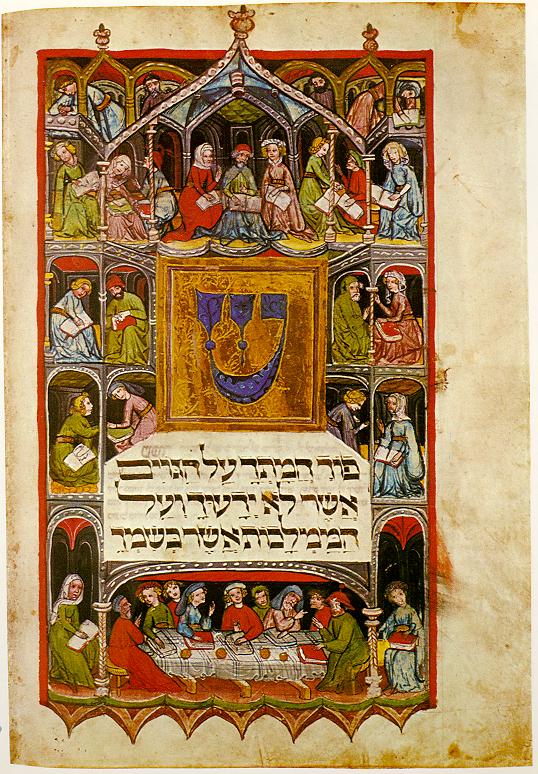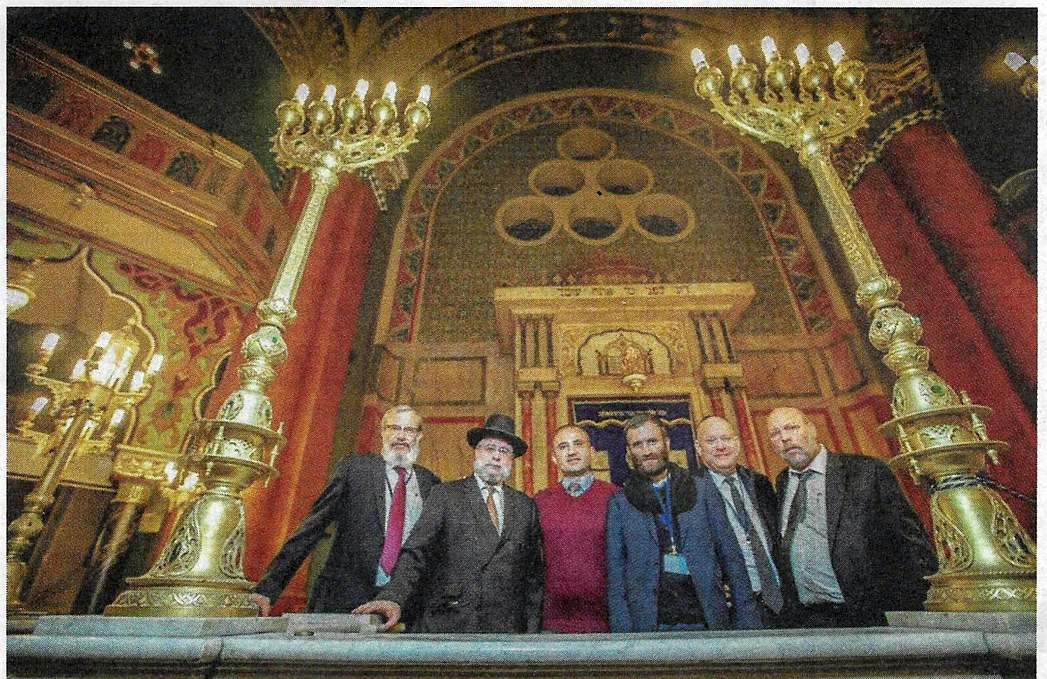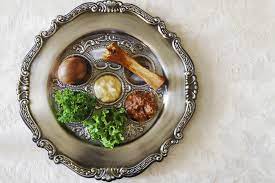| |
The Darmstadt Haggadah (15th_cent). Every figure holds a book and discusses yetzias Mitzrayim.

This Google Custom Search looks only
in this website.
Pesach in Europe in the Pandemic
In Israel, with most of the country vaccinated, and in large chareidi communities in the US (for various reasons), life is recovering a semblance of normalcy. But in most of Europe this is far from the case. There are strict curfews in many areas. This is a rundown on the situation in some communities.
Georgia: Usually People Make Private Sedorim
The Rabbi of Georgia, Rav Elimelech Rosenblatt, the rav of Beit Knesset Tiferes Tzvi, who also runs schools and charitable organizations, tells Yated:...

Netanyahu's Obsessiveness
One of Netanyahu's most effective campaign stories comes from chutz la'aretz. Albert Burla, the CEO of Pfizer Inc., talked about Netanyahu's obsession in an interview that he gave. He explained why Israel managed to get unlimited vaccinations, way ahead of other countries.
Burla described how Netanyahu called and called him — altogether more than thirty times. Sometimes he even called in the middle of the night to talk about vaccines.
We and Our Children and Our Children's Children
A Compilation of Anecdotes and Pearls for the Seder Night
For His Lovingkindness Has Overwhelmed Us
The famous ger tzedek, the Count Pototzky, was tortured terribly before he made his public kiddush Hashem. Before he was taken out to be killed it seems that some of his judges had some inkling of the truth. They asked the count to forgive them and not take revenge on them in Olam Habo. He answered wittily:
"Dovid Hamelech a'h writes in Tehillim (117:1): `Praise Hashem all nations . . . for His kindness has overwhelmed us.'
"Why do the non-Jews have to praise Hashem because His kindness has overwhelmed the Jews?
"This can be explained by a moshol...

Rain and Kinneret Watch
by Dei'ah Vedibur
Staff
Our weekly report of the rain and the level of the Kineret -
Winter, 5781.
* * *
The Darmstadt Haggadah (15th_cent). Every figure holds a book and discusses yetzias Mitzrayim.

/>
|
From Our Archives |
|
Understanding Leil HaSeder
by HaRav Shimshon Pincus, zt'l
HaRav Shimson Pincus zt"l was killed, along with his wife and daughter, in a tragic car accident twenty years ago on the 13th of Nisan. In addition to being the rov of the kehilla of Ofakim, Israel, HaRav Pincus lectured and participated in seminars throughout the world. The following article is taken from a taped lecture "Leil HaSeder" that he delivered in the U.S.
Part 2
The Leil haSeder is a very special night. There is a saying by tzaddikim that the Leil haSeder gives you a seder for the entire year. If we experience the Leil haSeder properly, it's a wonderful experience and it can make a revolution within us and in our attachment to Hashem.
The first part of this lecture was printed in our Pesach edition 5762, and a link appeared in the edition of last week. HaRav Pincus explained that Pesach was and is the birth of the Jewish people, every year. There are three partners in man: the father who gives the "white" (bones) parts of the body, the mother who gives the "red" (blood and meat), and Hakodosh Boruch Hu Who gives the soul. On Pesach the matzoh, which gives basic emunoh, is the white part. The arba cosos of red wine give the excitement (hislahavus) about Hashem, and the sippur yetzias Mitzrayim is the soul added by Hashem. On Pesach, Hashem also opens for us a supernatural way to understand concepts above our heads, like the chipozone in Egypt.
*
There is another interesting aspect of the Leil HaSeder that at first appears to be just a side dish. On Leil HaSeder we eat carpas, vegetables. This looks inappropriate for a yom tov table. We have bread, which happens to be very special bread, we have meat, we have wine, and all of a sudden we have carpas, a piece of celery or a potato.
|
Pesach
by HaRav Moshe Feinstein, zt"l
The Reason for Shabbos Hagodol
Two miracles occurred on the tenth day of Nisan. There was the miracle of the selection and purchase of the [animal for the] Korbon Pesach, as is brought down in the Tur (Orach Chaim 430) and, [years later,] the miracle of the crossing of the Jordan River (Yehoshua 4:19). Upon deeper thought, one is puzzled to realize that, while we have an ongoing yearly commemoration of the nes Korbon Pesach, for the miracle of the crossing of the Jordan River we have no commemoration at all.
The Taz (ibid.) further explains in the name of Rav Moshe Chorif that our annual commemoration of the nes Korbon Pesach was designated for a Shabbos, and not on the tenth day of Nisan which is the calendar date when the miracle actually took place. The reason for this is to clearly indicate that our commemoration is only of the nes Korbon Pesach, and not of the nes of the crossing of the Jordan River, which also took place on that date.
The nes Korbon Pesach actually took place on Shabbos. The nes of the crossing of the Jordan River did not take place on Shabbos. Therefore, by designating Shabbos as the annual commemoration day, it is made clear that we are commemorating the nes of the Korbon Pesach, and not the nes of the crossing of the Jordan.
Yet what would be so terrible if one were to mistake the commemoration of the nes Korbon Pesach for the commemoration of the crossing of the Jordan? Does this warrant that the miracle's commemoration be designated for Shabbos rather than the calendar date of the tenth of Nisan which is when it actually took place?
|
The Purpose of Life
by Mordecai Plaut
A story is told of the philosophy professor who gave a final examination consisting of one word: Why?
According to the story, this was enough to touch off long essays by most of his students. However the paper given the highest grade was very short. It consisted of two words: Why not?
There may have been a philosophy professor who gave that answer an "A" but from the Torah perspective that answer is failing.
|
Poskim Rule that One Should not Smoke on Yom Tov
by Yated Ne'eman Staff
" . . . [Regarding the question of smoking on Yom Tov] I heard from Maran Posek Hador HaRav Yosef Sholom Eliashiv that although in previous generations we saw the custom was to follow a lenient practice and to allow smoking, relying on the lenient opinions even on Yom Tov Rishon, nevertheless now that there is universal agreement and it has become widely known that smoking harms one's health and there are educational campaigns to prevent children from smoking starting at the age of chinuch and smokers remain in the minority, smoking should be prohibited midinoh on Yom Tov."
-- HaRav Moshe Mordechai Karp (Mevakshei Torah, Hilchos Yom Tov)
"Rabbenu Nissim Karelitz shlita, av beis din of Ramat Aharon, has issued directives in this matter saying that now that physicians hold unequivocally that cigarette smoking poses a health hazard, the main reason for permitting smoking on Yom Tov has fallen by the wayside."
-- HaRav Yehuda Aryeh Dunner (Booklet entitled Mekadesh Yisroel Vehazmanim)
...
|
A Middos Workshop: Ta'avah-The Thirst for Salty Water (Part 1)
Based on shiurim of Rav Dovid Siegel
Chocolate cake. Crembos. Corn chips. Potato chips. Orange soda. Ice pops. Sports cars. Swivel chairs. Fast food. Automatic ice dispensers. The last century has introduced new concepts -- a whole new vocabulary -- of luxuries designed to pamper us. Temptation has reached new levels unheard of in the past, attacking us at every turn, with every billboard, continuously inventing new angles to pull us under its spell.
Given these circumstances, overcoming temptation is nearly impossible.
In fact, the posuk describes the nozir's vow with the words "Ish ki yafli, when he does a wondrous thing." What is his spectacular feat? He refrains from his passions. The Ibn Ezra comments that it is wondrous, because he controls himself in a world where most people are enslaved to their passions, their ta'avos.
Slaves to our Passions
People rationalize giving into their desires by saying, "I couldn't help myself," "I couldn't control myself," "I had a craving for it, and I gave in."
Who is this "self" that I could not control? To whom am I giving in? It is none other than I! I should be controlling myself, but I feel that I cannot.
|
Sitck Figure
a story by Sara Gutfreund
Shira is cleaning for Pesach. She is in the boys' room now, and the mess overwhelms her. When are they going to clean their own room? They're teenagers now, Shira reminds herself with a sigh. Maybe she is isn't raising them right. She can never seem to convince them to help around the house.
Opening the first drawer in the dresser, Shira begins to make three different piles: "discard," "maybe discard," and "keep." As always, Shira begins to philosophize as she cleans. This is just like my life, she thinks. Some parts I should really just throw out, some parts I'm not sure and other parts I definitely want to keep.
A small picture interrupts Shira's thoughts. It is a crayoned picture of a little boy crying. On the bottom, Binyamin has scribbled his name and kita alef. Kita alef? Shira fingers the yellow construction paper and tries to recall this picture. Binyamin is fifteen now; it is hard to remember kita alef. But then the memories come, one after the other.
Binyanim with his blond hair and mischievous grin. His lopsided kipa and his endlessly ripping pants. He runs in from cheder, throws down his bag and immediately begins teasing the baby. Every day Shira dreads his homecoming. She just can't control this child. The other children wash their hands and sit down to lunch. No amount of yelling or threats convince Binyamin to follow. And every day another note from his Rebbe. Binyamin hit Daniel. Binyamin didn't hand in his homework.
She and her husband run from one chinuch expert to another. They daven. And Binyamin somehow keeps going from one year to the next -- just inching by. Until this year, that is. This year Binyamin starts hanging out with a bad crowd. Tatte threatens him and punishes him. But all the grounding in the world doesn't help. Their Rav tells them to let him be and to just be positive towards him.
Positive? What can they say to him? And so, they ignore him, pretending not to notice when he won't sit down to the Shabbos table. Looking away when he sleeps through minyan. Shira says Tehillim. She runs to the Kosel and pleads: Help us! But Shira is sure now that she has never seen this picture.
Binyamin must have drawn it and put it away himself. The little boy is crying in the picture. He is all alone. It is a stick figure, the messy drawing of a six- year-old, but it makes Shira cry nonetheless. She puts her head down in her arms and sobs. All that time, throughout all of Binyamin's antics, she has never felt his pain.
|
| | | | |
POPULAR
EDITORIALS
Av, 5765 - Kislev 5766 (August-December 2005)
|






.jpg)


